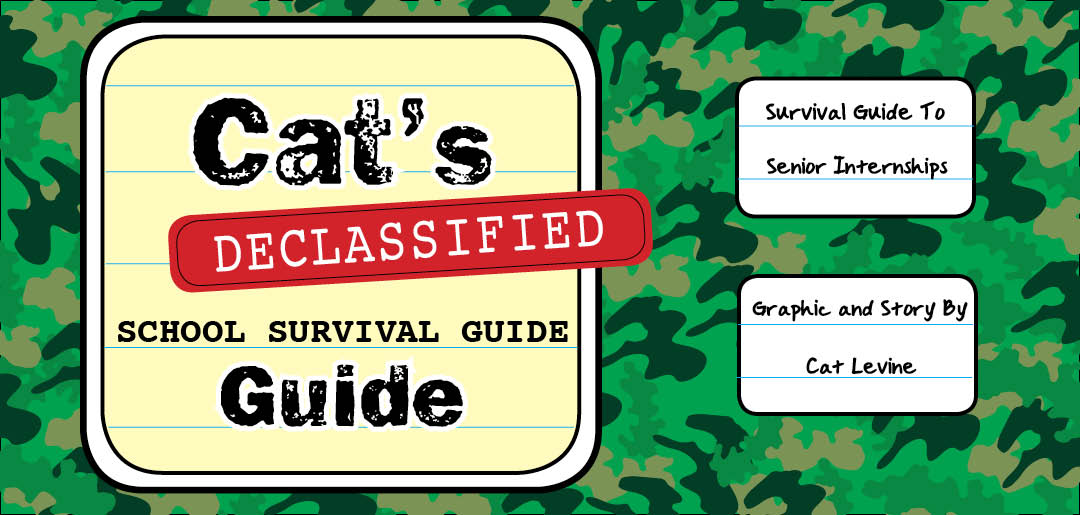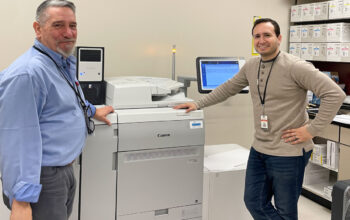Cat Levine, Executive Editor
@catcourant
Like many of the other 308 seniors who have applied for the senior internship program, I’m looking forward to it with a mix of excitement and anxiety. Over the last 13 years, I’ve gotten used to understanding what teachers want. Whether it be reading through rubrics or teacher feedback, I adapt my work to their expectations. Now we are entering the real world where we have to interview with adults who don’t know us and complete who knows what kind of work. Although the unknown might seem scary at first, I spoke with key figures in the internship process to learn more about how we will be spending our last few weeks of high school. I’m here to share guidelines of how I’m going to survive the senior internship.
Step 1: Applications
For the past few weeks, conversation among seniors has revolved mainly around the senior internship and the deadlines for applying either to self design or go through the program. I wasn’t sure whether or not I should self design, so I spoke to Heather Bianco, head of the senior internship program. She reassured me that although there are plenty of opportunities for all seniors, self designing is another option for those who are passionate about fields not already listed. “If there is something a student is really interested in that we don’t already offer, they should go for it. Once they submit the forms, it still has to get approved,” she said. “We have to call the site and make sure that it is in a certain radius of the school and a legitimate office.”
Step 2: Interviews
As a senior and member of the Courant, I’ve been through dozens of interviews for college and articles as both questioner and questionee, however the senior internship interview seemed particularly daunting to me. I asked Ms. Bianco to elaborate on who would be in attendance and what we would be discussing during this interview. “It’s only about 15 minutes and it’s just a basic interview so we can get to know more about you,” she said. “We’ll review the essay and ask questions. It helps us to find the best place to put you based on your interests.”
However, it doesn’t just end with the senior internship committee interview. Ms. Bianco expanded that if you decide to take part in an internship already chosen by the school, some require us to complete a separate interview with the site. These interviews will differ from the former because the site wants to find out more personal information about you as a candidate and if it is the right fit for you. “30-40% of internships are requesting formal interviews with students,” she said. “A student can not be placed until the intern site gives confirmation to the school.”
Step 3: Matching with Mentor
Administration isn’t just throwing us into the internship and expecting us to understand how everything works. Ms. Bianco described that we would be assigned a mentor based on the teachers skills, interests, and location. These mentors would help answer any questions and keep track of us as we immerse ourselves in our internships. “The mentor will be reading the students journal entries every week and visit them once in their three weeks at the intern site,” she said. “Prior to the internship, students should reach out and have a phone call to introduce yourself to your mentor.”
Step 4: Training Sessions
Beyond the mentor that we are paired with, the senior internship program is ensuring that we come into the workplace fully prepared. Ms. Bianco spoke of certain dates that we are given training sessions. As someone who doesn’t have much experience working in professional offices, these training sessions will address a variety of topics ranging from what to wear to business mannerisms. “March 21st and May 21st, the monday after AP’s, students will receive training on how to prepare before your internship. We’ll go over everything from dress code to workplace etiquette,” she said. “These training dates are mandatory because they’re really important as we give out helpful advice.”
Step 5: Internship Hours
During the first quarter of my senior year, a typical night’s sleep would be anywhere from 2-6 hours. A main reason for excitement is the promise of getting to sleep in past the usual 7:30 school start time. Ms. Bianco told me that hours would vary based on the internship site. Students should look for potential timing constraints such as the awards assembly and college orientation. “Most of the time, because students have extracurricular activities, the hours will be 9-2. However, the times can vary based on the site to define what they need,” she said. “When you’re looking at the list of companies, it will have the list of the hours.”
Step 6: Business Attire
A main issue of concern for me is that I have no idea what to wear to this. Is this a jeans and t-shirt or dress and heels kind of attire? I talked with Drew Davis, a recent graduate from NCHS and current freshman at University of Michigan, who happily relayed her experiences preparing for her internship.“During my internship I wore business casual outfits- usually just skirts and casual dresses,” she said. “I didn’t feel the need to buy any new outfits, I just worked with what I had and got creative. I think as long as you look like you have made effort to look nice and respectable, you’ll be fine.”
Step 7: Lessons
There are plenty of internship opportunities, but are we going to be working with our peers or surrounded by employed adults? Drew worked at Grace Farms and told me that even though she worked in a professional setting, she also got to work with a few other seniors. “Luckily for me, I was not the only young person at my internship. There were five other interns from the high school as well as some college college aged students,” she said. “However, I definitely felt like I was in a more professional environment and it was really refreshing to be a part of that.”
Drew only reaffirmed my excitement, and contained my anxiety, by describing everything that she learned and gained from the experience as an intern. “I learned how to communicate with adults and others in a professional setting. I think that is something that everyone could always use practice in and my internship was one of my first experiences with that,” she said. “I truly felt like a valued member of the team for the short amount of time that I was there.”




